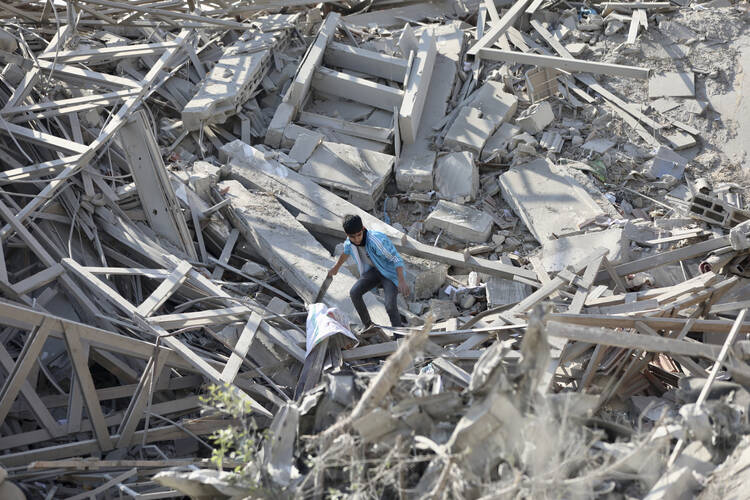America reached out to Caritas Jerusalem to find out how Gaza’s small Christian community is faring as the conflict between Israel and Hamas entered its fifth month and Israeli forces closed in around Rafah. George Anton, the administrative director of the Caritas Medical Center in Gaza, was able to respond by email.
Mr. Anton, his wife and their three daughters, like scores of other Christian families in Gaza, have sheltered at the Holy Family Church in Gaza City. At the beginning of the conflict, Caritas team members were able to transfer supplies and equipment from the medical center to establish primitive clinics at both the Holy Family and the Greek Orthodox Saint Porphyrius church compounds.
What is a typical day like under these difficult circumstances?
Our days are filled with distressing thoughts and sounds—shelling in one area, incursions in another and bombardments everywhere. We worry constantly about how we are going to find food and water.
Essentials like fruit, vegetables, rice, pasta, milk, flour and fuel are unavailable in the markets. Each day we plan how to get these necessities, closely following the news to understand who among the Caritas team can provide aid or carry on with their work at the medical center.
The struggle to secure our daily bread is exhausting. There is a shortage of everything. Nutritious food is non-existent. We have run out of medications and vitamins.
Very few people are able to work under the current circumstances. It is usually only those of us who submit these situation reports, professional people. Other dedicated Caritas Jerusalem workers, tirelessly preparing clinics, labs and performing maintenance, are still able to work.
This is how we spend our time during these days of war. Stress and worry accompany each passing day in this unsettling routine.
How are families and children holding up and managing day-to-day?
The struggle to secure our daily bread is exhausting. There is a shortage of everything. Nutritious food is non-existent. We have run out of medications and vitamins. The blockade by the I.D.F. only makes it worse, with the limited aid that enters often being taken by thieves and sold at excessive prices in the market.
A can of beans that cost two shekels now is 10 shekels. Milk was 12 shekels; now it is 45. So, you can imagine where the soaring prices are taking us. Even those fortunate enough to retain their jobs have difficulty getting our money to buy the things we need. The money gets deposited in the bank, but most A.T.M.s have been shelled, and internet restrictions hinder access to bank accounts.
I cannot find the right words to describe what we are going through exactly, but this is the type of daily life we have. The market may have some clothes, but all the warm clothes are gone. People are homeless during cold winter weather.
It is much worse than what you see on the screen. Life is shattered here. There are no safe shelters for people to find refuge.
Shelter centers are not safe. The Israeli military randomly raids the shelters and rounds up all the refugees. They kill some and forcibly displace the rest.
It is much worse than what you see on the screen. Life is shattered here. There are no safe shelters for people to find refuge. Sometimes people go to already-shelled houses and make tarp roofs with whichever material they find, and Israelis re-shell them all over again.
The destruction is systematic, leaving us without shops, pharmacies or businesses. A systemized destruction. This is the status quo.
Will members of Gaza’s small Christian community remain after the fighting finally stops?
Despite being outside the immediate conflict, we, as Palestinians, remain committed to our homeland, rejecting the idea of mass emigration, even though it crosses the minds of many Christians.
As Christians, our message is one of peace. We want both sides to negotiate honestly toward putting an end to the bloodshed.
While some contemplate leaving after the war, a substantial number of us resist such a notion. We are Palestinians, not Europeans, and we should stay here and protect our churches from becoming ashes due to the ravages of war. We are determined to preserve the Christian presence in Palestine. This is our homeland, and we are staying here.
Do you have a message for politicians in Israel and the United States?
As Christians, our message is one of peace. We want both sides to negotiate honestly toward putting an end to the bloodshed. We want them to be convinced that war and fighting do not contribute to any lasting peace. We want both sides to understand that innocent lives, like ours as Christians, are caught in the crossfire, without any connection to political conflicts.








